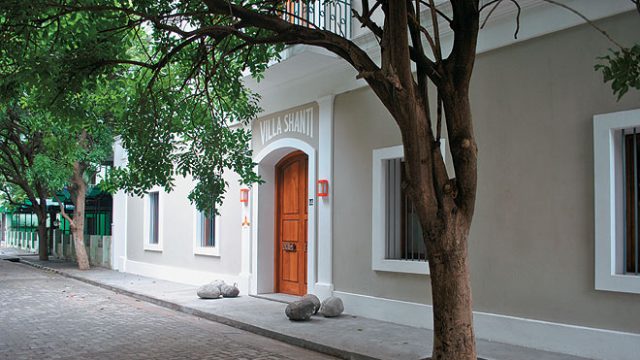Rue Suffren is not what you might call a quiet lane. Oh, the address is undeniably French Pondicherry but visitors who assume that to mean a certain whitewashed gentility aren’t always right. It could also mean a rubble-strewn street and so many two-wheelers stacked so economically on both sides of the road that a car may enter only with gumption and two inches to spare. Mind you, this is not so much a disappointment as it is a slight recalibration. Villa Shanti, the doors to which preside over this humming stretch of small-town commerce like a duchess might at a tea party, couldn’t have been given a truer name. A quiet elegance greets guests here, the sort we have come to associate with boutique hotels of distinction. That, and a thoughtfully constructed sense of space.
Pondicherry, in my estimation, has acquired an enviable diversity of classy hotels for a destination so small. Its reinvention into a tourism hotspot came about long after Kerala raised the bar on how incredible India could get, and its compact landscape, all of it entirely at sea level, makes it rather more accessible — I must, of course, plead guilty to living in Madras, which makes it so. In the last five years, the handful of characterful hotels here has grown to a bouquet and their number now qualifies as significant, both in brand names and experiences. These hotels, it can be said, have collectively woken old Pondy from its drowsy existence into something approaching a delightful insouciance. If people drive to Pondy, it’s now often for reasons other than paying their respects at Aurobindo Ashram or registering new vehicles for lower taxes. A weekend at Pondy is easy to arrange and easier to do — an evening walk down the no-traffic seafront about the most strenuous effort managed by most visitors before they retreat gratefully to the aforementioned boutique hotel experiences which, by definition, have to be exquisitely unique. Villa Shanti is.
It took four years to restore the main building, a nineteenth-century heritage structure (hence the absence of a car park) fronted by a modern extension that just wasn’t working and had to be torn down. Villa Shanti can therefore be called partly old and partly new, though this is hard to tell — French architects Tina Trigala and Yves Espirit were certain they wanted to take the colonial language but give it what they call a new dialect. Trigala, who is soft-spoken and bilingual, has divided her time between Paris and Pondicherry ever since the project kicked off. Her enthusiasm for matching Indian aesthetics to Western sensibilities is evident everywhere—the original doors have been thematically recreated but they are slimmer and taller; the new pillars are square instead of the original round. White, grey and wood dominate the spare yet sunny colour schemes. The wash-basins are rough-hewn granite — only the bowl is cut and polished—an experiment that caused its makers many trials and errors as they pre-selected stones and worked on samples. The soap dishes are inspired by the kallu (stone) used by village women to scrape fresh turmeric for their daily bath-and-beauty routine; the vases are rice padis (measuring cups). The flooring is unpolished granite — relatively uncommon in the vernacular and very pleasing — juxtaposed with hand-laid red oxide, now a frequently revived tradition that never fails to create atmospheric interiors. But it’s the spaciousness of its rooms that immediately announces Villa Shanti’s desire to be taken seriously. Moreover, the standardisation is only thematic — every room is customised in its details.
Trigala and Espirit, who confess to struggling with Indian contractors and differences in work cultures as they transferred their plans for Villa Shanti from drawing boards to tangible 3D, have been ably abetted by graphic designer Elisabeth May in managing just that. Quirky and contemporary, she has persuaded painters of film posters to liven up the bar, store, stationery and other signages with a forgetful Dush-yant and a ravishing Shakuntala, investing in hand-printed paper and splashes of sudden colour to achieve a “muted brightness”. There is no elevator but rooms are available on the ground floor for those with mobility issues.
There’s a courtyard that’s open-to-sky, and the restaurant facing it is styled more like a café than a formal dining room. The recently revised menu with a selection of seafood specialities is modest in size but rich in temptations. The zucchini and walnut crêpes make a lovely main course; the orange and almond cake with chocolate mousse is sinfully good. Alcohol, oddly enough, is available only three days of the week. However, the bar features expansive sofas alongside stacks of magazines and books to immerse yourself in — and it stands right by the entrance. Like the restaurant, it’s not air-conditioned, leaving Villa Shanti with the distinctly tropical air of something more than a B&B (as TripAdvisor lists it) but also something decidedly less opulent than a luxury hotel. Naturally, when there are only fifteen rooms to pamper, small becomes beautiful. Open since December last year, they have all their glitches sorted out (don’t mind the website). Service, which is quick and efficient, is laidback but not casual, if you get my drift. It’s all very French, really.
The information
Location 14, Rue Suffren, Pondicherry. Chennai, the nearest major railhead and airport, is three hours by road.
Accommodation 11 rooms (9 deluxe, 2 superior deluxe), 4 suites (2 junior suites, 1 executive suite, 1 terrace suite)
Tariff Rs 7,000 (deluxe rooms); Rs 8,000 (superior deluxe rooms); Rs 9,000 (junior suites); Rs 11,000 (executive and terrace suites). Prices include breakfast but not taxes.
Contact 0413-4200028, lavillashanti.com




